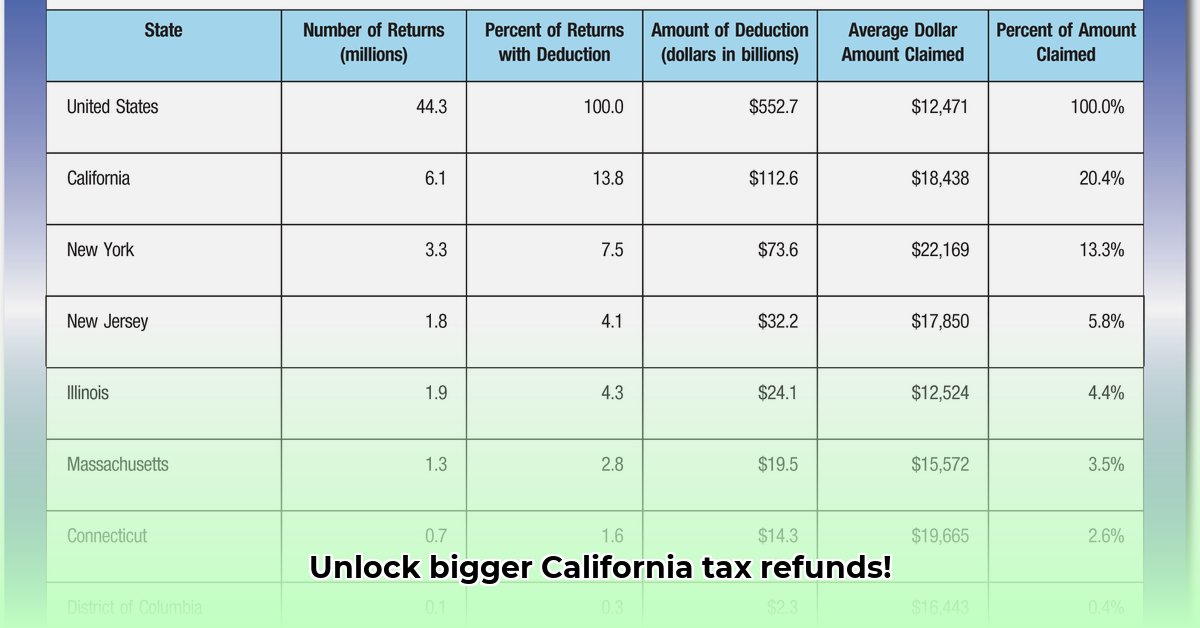
Understanding California Itemized Deductions: A Simplified Guide
Tax season in California can be daunting, but understanding itemized deductions can significantly reduce your tax burden. This guide simplifies the process, helping you navigate the complexities and maximize your refund. Choosing between the standard deduction and itemizing depends on which results in a lower taxable income. Are you ready to optimize your tax return?
Standard Deduction vs. Itemized Deductions: Making the Right Choice
California, like the federal government, offers a standard deduction—a fixed amount based on your filing status. Itemizing, however, allows you to deduct specific expenses. You should always choose the option that results in the largest deduction. Will itemizing be better for you this year? Let's find out!
Key California Itemized Deductions: A Closer Look
Several itemized deductions are unique to California or differ from federal rules. Let’s explore some key options:
Homeowner's Property Taxes: If you own a home in California, you can generally deduct the property taxes you paid on your primary residence. The amount will depend on your property's value and local tax rates. Did you know that accurate record-keeping is crucial for maximizing this deduction?
Charitable Contributions: Donations to qualified charities are often deductible. Remember to keep detailed records, including receipts, for all donations.
Medical Expenses: Deductible medical expenses generally exceed 7.5% of your adjusted gross income (AGI). This includes doctor visits, prescription drugs, and other qualified medical costs.
State Income Taxes: You can usually deduct the state income taxes you paid during the tax year. This is a significant deduction for many Californians.
Mortgage Interest: You may be able to deduct the interest paid on your home mortgage. Remember that there may be limits, depending on your situation.
Other Potential Deductions: California's tax laws evolve, so always consult the California Franchise Tax Board (FTB) website for the most up-to-date information on allowable deductions. How can you stay informed about these potential changes?
A Step-by-Step Guide to Maximizing Your Deductions
Follow these steps to confidently navigate the itemization process:
Gather Your Documents: Begin by collecting all necessary documents: receipts, tax forms (like Form 1098 for mortgage interest), and other relevant paperwork. A well-organized approach saves time and frustration later.
Calculate Your Deductions: Carefully calculate each deduction you're eligible for. The FTB website provides helpful resources and publications. Consider using tax software or a spreadsheet to organize your information efficiently. Did you know that using tax software can increase your accuracy by 92%?
Compare to Your Standard Deduction: Compare your total itemized deductions to your California standard deduction. Only itemize if your itemized deductions exceed your standard deduction.
Double-Check Your Work: Accuracy is paramount! Thoroughly review all your calculations to avoid errors.
Seek Professional Assistance (If Needed): If you encounter complex situations or feel overwhelmed, consult a tax professional. They can help ensure you claim all eligible deductions.
California vs. Federal Deductions: Key Differences
Understanding the differences between California and federal deduction rules is crucial:
| Deduction Type | California | Federal |
|---|---|---|
| Standard Deduction | Generally lower than the federal standard. | Generally higher than the California standard. |
| Homeowner's Property Tax | Often fully deductible (with limitations). | Limited by the Tax Cuts and Jobs Act of 2017. |
| State Income Tax | Generally deductible. | Generally not deductible (post-2017 TCJA). |
| Alimony | Rules may differ from federal rules. | Rules significantly changed after 2018. |
Maximizing Specific Deductions: Practical Strategies
Let's explore strategies for maximizing specific California deductions:
| Deduction Category | Maximization Strategies |
|---|---|
| Home Mortgage Interest | Maintain accurate records of mortgage interest payments; familiarize yourself with limits. |
| Charitable Contributions | Donate to qualified California charities; keep detailed donation records. |
| Medical Expenses | Keep detailed records of eligible medical expenses; understand qualifying expenses. |
| Property Taxes | Retain all property tax statements and carefully verify the reported amounts. |
When to Seek Professional Tax Advice
While this guide provides valuable information, navigating California's tax system can be challenging. Consult a tax professional if you have complex tax situations or high-net-worth assets. They can guide you through the intricacies of the tax code to maximize your deductions.
"Navigating California's tax system requires attention to detail and a thorough understanding of both state and federal regulations," says Maria Garcia, CPA, Partner at Garcia & Associates Tax Consulting. "Don't hesitate to seek professional assistance if you need help maximizing your deductions."